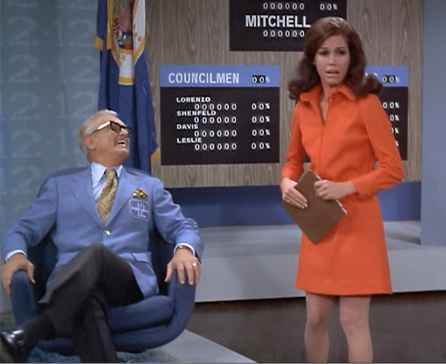Contrary To Mary
At the AV Club Todd VanDerWerff has a good discussion of the Valerie Harper sitcom Rhoda, but there are a few statements I take issue with. The show lasted four and a half seasons but was on its way down in popularity by the third. VanDerWerff notes this is because it broke up central couple Rhoda and Joe, which displeased the audience. True, but it was probably in trouble anyway.
Rhoda was a spinoff of The Mary Tyler Moore Show, and to differentiate itself the producers decided to give Rhoda a successful relationship which soon led to marriage. This was, ratings-wise, the high point of the series, and while it remained successful for its first two years, it really had nowhere to go dramatically or comedically at this point. Domestic bliss isn't funny, so the two had to have some problems, and with poor casting choice David Groh as Joe slowing down the fun, breaking them up was probably the right thing to do.
But I'm more troubled my VanDerWerff's claims about The Mary Tyler Moore Show:
Rhoda was also explicitly Jewish, something that drove both the character and stories about her from time to time. The comedies of the MTM Productions studio that produced Mary Tyler Moore were rarely as political as those produced by Norman Lear (of All In The Family), but Rhoda allowed for an occasional window into important issues, like the struggle against anti-Semitism.
Rhoda's Jewishness helped define her character (and to this day many believe Valerie Harper is Jewish), but it rarely played a part in the show beyond a few gags here and there. Yes, the episode "Some Of My Best Friends Are Named Rhoda" does deal explicitly with anti-Semitism, but it was an experiment with an "issue" show that MTM wisely never tried again. It plays oddly and is one of the series' weaker half hours.
I'm more troubled by VanDerWerff calling such episodes a "window into important issues." Your relationship with your friends, your family, your co-workers--these are important issues, and every episode of Mary Tyler Moore deals with such things. Meanwhile, a Norman Lear show where people are fighting about Watergate or the ERA or Vietnam seems far less important. (Even then it did, but certainly now).
Rhoda was developed by David Davis and Lorenzo Music [...] and they made two key choices to differentiate Rhoda from the other “single girl in the city” comedy that had given birth to it. The first choice was to play up the series’ social-issues storytelling just a bit more. [....I]n one early episode, a boyfriend of Rhoda’s suggests she should move in with him, something that would have been unthinkable for Mary Richards. All of this is grounded in the gentle humanism of the MTM house style, but it’s bolder than anything that had happened on Mary or on The Bob Newhart Show.
I don't think so. Mary, as mild as she was, and as sweet as the tone of the show was, was still a woman with a healthy sexual appetite. She dated many guys and slept with some. As the show made clear, she was on the pill. They even considered giving her a regular boyfriend, Joe (Ted Bessell), but that didn't work out dramatically so they went back to the date-of-the-week format.
For that matter, the plots on Mary prefigured some of where Rhoda was going. Before Harper even got a series central characer Lou Grant had marital problems, as first shown on the Emmy-winning episode "The Lou And Edie Story." He ultimately got divorced, which didn't happen on TV in those days. But it did help pave the way for Rhoda.
For that matter, Bob Newhart would sometimes get into social issues, like the burgeoning women's movement, via his intertaction with patients, but we can discuss that show some other time.




3 Comments:
So what does Adam Sandler have to say about her?
Nothing, I hope.
I remember an episode where Mary's parents were in town, and came to see her early one morning. EIther Phylis or Rhoda let them into her apartment so they were waiting when she arrived in her clothes from the evening before. WHat was interesting (to me) is that while a tad awkward, the rest of the episode was not about the awkwardness of the situation, Mary's parent's shock or anything like that (which would be the topic of most lame sitcoms even today). The episode was a humorous look at parents overstepping bounds with their 30 year-old daughter, even as they were experiencing changes in their own married relationship.
MTM was somehow nuanced and believable, while Rhoda was stereo-typed, common fare, with the possible exception of Rhoda's sister Brenda. This is not Valerie Harper's fault, and does not deminish in any way the integral part she played in MTM.
Post a Comment
<< Home